|
|
|
Sort Order |
|
|
|
Items / Page
|
|
|
|
|
|
|
| Srl | Item |
| 1 |
ID:
171246
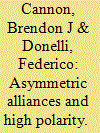

|
|
|
|
|
| Summary/Abstract |
The Middle East and the Horn of Africa exist in two distinct regional security complexes (RSCs), groupings of states exhibiting intense security interdependence within a distinct region, but rarely between regions. Recent geopolitical changes and related analyses, however, point to either a subsuming or a joining of the two RSCs, potentially leading to a high degree of uncertainty in two conflict-prone regions. Given the importance of such developments, we question this theory of RSC expansion by offering a concise review of recent security interactions between the two RSCs as well as quantitatively and qualitatively measuring the material power capabilities of relevant states. Borrowing from and contributing to RSC theory, we also identify and analyse concepts and indicators such as threat perception and sub-regional alliances. Our findings demonstrate the Middle East RSC is not expanding to include that of the Horn of Africa. The two remain distinct and under internal consolidation, despite the current discourse. Rather, high polarity in the Middle East coupled with often-congruent interests in Horn of Africa states best explains the current pattern of their interaction, particularly as Middle East states pursue strategies that further their own security interests at the expense of rival states within their own RSC.
|
|
|
|
|
|
|
|
|
|
|
|
|
|
|
|
| 2 |
ID:
170228
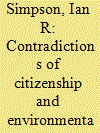

|
|
|
|
|
| Summary/Abstract |
This article scrutinizes the limitations of environmental citizenship among citizens and non-citizens in the Arab Gulf states, with a focus on the United Arab Emirates (UAE). There are particularly heightened concerns about water scarcity, food security, marine pollution, and dependence on oil and gas industries and how states can address these challenges in the Gulf Cooperation Council (GCC). Yet environmental citizenship in the Indian Ocean’s Arabian littoral remains poorly understood both in terms of theoretical and grounded questions. This article considers how labor relations and discourses relating to citizenship, environment and sustainability enable or foreclose environmental reform in GCC countries. It shifts the technological and economic focus predominant in literature on sustainability in the GCC to take a more social perspective and examine distinctions between citizens and non-citizens and the depoliticising of environmental claims and national industrial legacies.
|
|
|
|
|
|
|
|
|
|
|
|
|
|
|
|
| 3 |
ID:
173820
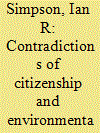

|
|
|
|
|
| Summary/Abstract |
This article scrutinizes the limitations of environmental citizenship among citizens and non-citizens in the Arab Gulf states, with a focus on the United Arab Emirates (UAE). There are particularly heightened concerns about water scarcity, food security, marine pollution, and dependence on oil and gas industries and how states can address these challenges in the Gulf Cooperation Council (GCC). Yet environmental citizenship in the Indian Ocean’s Arabian littoral remains poorly understood both in terms of theoretical and grounded questions. This article considers how labor relations and discourses relating to citizenship, environment and sustainability enable or foreclose environmental reform in GCC countries. It shifts the technological and economic focus predominant in literature on sustainability in the GCC to take a more social perspective and examine distinctions between citizens and non-citizens and the depoliticising of environmental claims and national industrial legacies.
|
|
|
|
|
|
|
|
|
|
|
|
|
|
|
|
| 4 |
ID:
148667
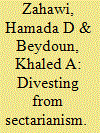

|
|
|
|
|
| Summary/Abstract |
Until recently, Iran has been economically isolated by way of sanctions, preempting investment opportunities with states allied with the United States. However, the Obama administration’s recent effort towards economic normalization with Iran affords it with unprecedented commercial possibilities, and per the focus of this article, legalized commercial enterprising within Saudi Arabia, the United Arab Emirates, and other Gulf Cooperation Council (GCC) States—across sectarian tensions and fault lines. From both a legal and practical prism, this article investigates the recent lifting of sanctions, which opens the door for Iran’s investment within neighboring states including the GCC. Subsequently, it analyzes how commercial investment and the reciprocal advancement of economic interests offers a promising pathway toward eroding political standoffs, economic inequities, and the politicization of sectarianism. In closing, the article addresses salient challenges that may hinder the potential of this economic rapprochement, and ways forward.
|
|
|
|
|
|
|
|
|
|
|
|
|
|
|
|
| 5 |
ID:
169446
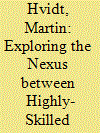

|
|
|
|
|
| Summary/Abstract |
This article explores the nexus between immigration of highly-skilled persons and economic growth in the Arab Gulf states, until now a significantly understudied topic. It is argued that long-term growth primarily stems from technological progress and the article conducts a qualitative analysis of the degree to which the group of highly skilled migrants contributes to technological progress. The paper focusses on the United Arab Emirates (UAE) but reflects general issues pertaining to the Arab Gulf states. It concludes that the policy framework that manages the migration system, the so-called Kafala (sponsorship) system, indeed has positive effects, namely that it ensures that all migrants are in employment and the skills of the migrants complement rather than overlap with the skills of the locals. However, asymmetric power balance between sponsor and migrant, the built-in inflexibility in relation to job mobility, and the lack of a broader sense of inclusion in the hosting country all diminish the contribution of the highly-skilled migrants to these economies. A culture of transience prevails which leads to short term thinking, less innovation and less likelihood of entrepreneurship. Finally, the article finds that due to demographic realities, lack of incentives for the migrants to pursue knowledge transfer and the general educational level in society, transfer of technology most likely takes place from one migrant to the next, thereby bypassing the local population.
|
|
|
|
|
|
|
|
|
|
|
|
|
|
|
|
| 6 |
ID:
172388
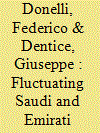

|
|
|
|
|
| Summary/Abstract |
The overthrow of Omar al-Bashir after three decades of rule has brought to light a dynamic that has been present for years: an interweaving of political, economic and security issues between the states of the Horn of Africa and the Gulf monarchies. Since 2011, the most active powers are the Kingdom of Saudi Arabia and the United Arab Emirates, which seek political support to counter both Iran’s influence and the growing Turkish presence. The two Gulf monarchies’ search for alignments with African counterparts has favoured the continuous reshuffling of alliances with direct effects on the local actors’ strategic choices. These dynamics need to be considered to understand the determinants behind the currently increasing instability in the Red Sea area.
|
|
|
|
|
|
|
|
|
|
|
|
|
|
|
|
| 7 |
ID:
192700
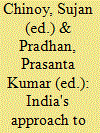

|
|
|
|
|
| Publication |
New Delhi, Pentagon Press, 2024.
|
| Description |
xix, 173p.hbk
|
| Standard Number |
9789390095971
|
|
|
|
|
|
|
|
|
|
|
|
Copies: C:2/I:0,R:0,Q:0
Circulation
| Accession# | Call# | Current Location | Status | Policy | Location |
| 060472 | 327.54056/CHI 060472 | Main | On Shelf | General | |
| 060473 | 327.54056/CHI 060473 | Main | On Shelf | General | |
|
|
|
|
| 8 |
ID:
089126
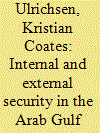

|
|
|
|
|
| Publication |
2009.
|
| Summary/Abstract |
This paper examines how the concept of "Gulf security" is evolving as internal political and socioeconomic changes in the Gulf states interact with the process of globalization and the impact of international events in this volatile region.
|
|
|
|
|
|
|
|
|
|
|
|
|
|
|
|
| 9 |
ID:
090975
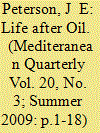

|
|
|
|
|
| Publication |
2009.
|
| Summary/Abstract |
There have been three economic transformations of the Arab Gulf. Yet the obstacles today remain eerily similar to those of forty years ago. Oil reserves are finite and nonoil resources in the gulf states-minerals, arable land, skilled population, and even capital for some countries-are scarce. Thus the path to economic diversification is especially difficult. While half of the six Gulf Cooperation Council countries enjoy sizable surplus income at present, the other three face immediate requirements for replacing oil income. The various strategies chosen to prepare for a viable economic future differ according to the group, and the task is further complicated by authoritarian regimes and inefficient state planning.
|
|
|
|
|
|
|
|
|
|
|
|
|
|
|
|
| 10 |
ID:
142898
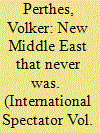

|
|
|
|
|
| Summary/Abstract |
How lucky the Middle East was, I thought as I re-read my International Spectator piece of 1996, when the worst nightmares of Arab opinion leaders were connected to the political risks involved in what seemed like an emerging new regional division of labour brought about by a peace treaty between Israel and its Arab neighbours. A substantial part of the Arab intellectual and political elites at the time feared that their countries would lose in relative terms, compared to Israel, if a comprehensive settlement of the decades-old Israeli-Palestinian and broader Arab-Israeli conflict were to lead to an economically integrated “New Middle East”.
|
|
|
|
|
|
|
|
|
|
|
|
|
|
|
|
| 11 |
ID:
122166
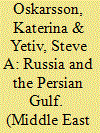

|
|
|
|
|
| Publication |
2013.
|
| Summary/Abstract |
This article examines changes in Russia's diplomatic, trade, and energy relations in the Persian Gulf over time. Our data suggest that Russia's profile in the Persian Gulf is rising in the post-Cold War period. While Russian-Gulf state trade has not reached high levels, trade and energy cooperation have increased significantly. These changes do not mean that Russia has jettisoned strategic interests in the Middle East writ large - as its support of Syria, or to some extent Iran, may indicate - or that it no longer seeks to balance against Washington. But it appears that in the mix of its foreign policy motivations, trade and commerce with Arab Gulf states matter much more now than they did in the past. Should such ties continue to strengthen, they may give Russia greater reason to cooperate with Arab Gulf states on contentious regional issues.
|
|
|
|
|
|
|
|
|
|
|
|
|
|
|
|
| 12 |
ID:
178583
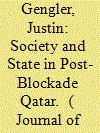

|
|
|
|
|
| Summary/Abstract |
This article examines key questions of citizen-state, citizen-citizen, and citizen-expatriate relations in the Arab Gulf states through the lens of the 2017 Qatar blockade. It utilizes original public opinion survey data that allow examination of the embargo’s short-term impacts on social and political relations in Qatar as well as broader trends observed over the period from 2010 to 2019. Results lend support to some existing qualitative accounts suggesting changes in important social and political dynamics in Qatar after the blockade. However, survey data also show that such post-blockade differences are mostly reflections of larger attitudinal shifts witnessed over the course of the past decade, rather than isolated effects of the GCC crisis. This suggests the possibility that other Gulf Arab states are experiencing similar transformations in popular sociopolitical orientations and behavior brought on by the same long-term drivers.
|
|
|
|
|
|
|
|
|
|
|
|
|
|
|
|
| 13 |
ID:
177202
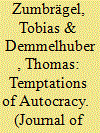

|
|
|
|
|
| Summary/Abstract |
In 2011 mass protests began to rapidly spread across the Middle East and scholarly attention shifted to the Gulf region, which not only remained resilient but rather asserted its authoritarian rule. We argue that such a development is considerably shaped by an individual protagonist country, we call an “authoritarian gravity centre” (AGC). We understand an AGC as an autocratic regime that has the willingness and the capacity (in terms of material and immaterial means) to apply pressure, to disseminate autocratic ideas, norms, values, and techniques, and to constitute a role model for other countries in the AGC’s geopolitical proximity. This study, which covers the period between 2001 and 2015, provides an empirical analysis of Saudi Arabia acting as an AGC in the Gulf. The qualitative research is based on fieldwork conducted in Riyadh, Doha, Kuwait City, and Manama. Using the approach of the AGC, we offer a conceptualization of the phenomenon of autocratization in the Gulf region.
|
|
|
|
|
|
|
|
|
|
|
|
|
|
|
|
|
|
|
|
|